Piano Technicians Guild
WESTPAC - Western and Pacific Regional Conference
February 26-March 1, 2015
DoubleTree by Hilton , Ontario, CA
Conference Schedule in Calendar Format [PDF] [revised 2/27/15]
Schedule by Class Category [PDF] [revised 2/27/15]
Tuning Classes
NOTE: Click on an instructor's name to see a bio.
A to Z Tuning
Move from the basics to advanced skills during this special 2-period class.
Basic Tuning Techniques include body stances and hand positions at both vertical and grand pianos for life-long, pain-free tuning comfort, accuracy and stability. We’ll also cover unison tuning basics, tuning hammers, mutes and muting (including Papp muting for faster and more stable treble section tuning in verticals).
Interval Tuning includes “The Six Things You Need To Know to Tune the Temperament,” a less complicated way to look at how you tune a temperament.
Temperament Tuning, focuses on The Potter Temperament, a “temperament 10th,” instead of just an octave. Find out why this temperament system will help you tune better aurally, especially when taking the PTG Tuning Exam.
Advanced Tuning Techniques builds on the basics and includes setting and stabilizing the string, tweaking (when, where, why and how – also when not and why not), dressing the string, and using competent ETDs (including Accu-Tuner, CyberTuner and Verituner) to achieve consistency and stability.
Are You ETD Dependent? How I Learned to Stop Worrying and Trust My Ears!
Hands on aural tuning class that will demonstrate techniques to achieve equal temperament. Emphasis will be on how to listen, temperament troubleshooting and interval tests. Prior knowledge of basic tuning theory recommended. Targeted toward associates who want to pass the tuning exam and all who want to gain confidence in their aural skills.
High-End Piano Boot Camp: A Million Easy Steps to Making a Piano Sing!
Take advantage of a full day chock full of high-end tips, tricks, methods and protocols that have been proven success-builders especially for those brave technicians who are committed to excellence. Based on the premise that the body is the ultimate tool, we will hear, feel, and see how to make a piano sing and find out how to accomplish that final five percent of piano work that makes a piano truly an instrument, not merely a machine. The class also includes segments on tuning, voicing, fine regulation, and subtle diagnostics. The number one prime directive is to help you have more fun, and make pianos sound better…the key to personal and professional success. Want to find out more? Click here for a flyer about this class
The Art of the Pitch-Raise
Doing a pitch raise quickly assures future tuning stability and should be accomplished in less than 30 minutes. Isaac will discuss needed observation techniques of piano BEFORE the pitch raise is done. He will endeavor to present both the aural and electronic pitch raises in 14-19 minutes each and share some shortcuts. In this class session, younger and beginner technicians can learn this valuable skill to increase their speed and income. Isaac learned this pitch raise technique from several old timers, while working on new and newly rebuilt pianos. He wishes this class to pay tribute to the legendary, late George Defebaugh, RPT.
The Deep Mysteries of Tuning Revealed
It has been said that tuning is “a complex puzzle which has no solutions.” This class will help unravel tuning mysteries by bringing participants to a better understanding of beats, inharmonicity, unisons and basic tuning checks. The basics of piano tuning theory that sometimes don't get taught that really are essential to understanding and developing good tuning skills will be taught in detail. With special listening devices provided for each attendee in order to enhance the learning experience.
The Smarter iRCT
Carl Lieberman, RPT [Reyburn Piano Service]
We explain the how and why of iRCT. All of its newest features will be presented. Tips on how to get the most out of the software will be explored.
Where Are Those Beats?
This class emphasizes aural skills and examines common temperament tests. What are beats? Where do beats come from? How do we use them? What are coincident partials? Why do proofs work? After your temperament is completed, how can you improve it? At class end, a system will be shown to improve an existing temperament.
Working with the Accu-Tuner IV
Paul Sanderson [Inventronics]
The Accu-Tuner IV has taken the features of previous Accu-Tuners and with a new brain is moving forward with new features. The new microprocessor lets you have more control over: the tunings, the pitch raising, and yet still retains the accuracy, long battery life and improved durability with a new case. Software for loading tunings to your computer is included with the Accu-Tuner IV. Come and see how you can use the Accu-Tuner IV to lighten your work load.
 Randy
is the founder and director of the Randy Potter School of Piano Technology
which has become the largest producer of training materials for piano technicians
in the world. Randy has written three books, and he is the editor of The Piano
Action Handbook, third edition, published by the Piano Technicians Guild. He
has produced numerous technical articles and over a dozen technical training
video tapes. Randy is a frequent instructor at local, state, regional and national
PTG conventions, and has taught at seminars in the U.S., Canada, Europe, Asia
and Cuba. Randy is the 2009 recipient of the Piano Technicians Guild Hall of
Fame award in recognition of service to PTG and the industry.
Randy
is the founder and director of the Randy Potter School of Piano Technology
which has become the largest producer of training materials for piano technicians
in the world. Randy has written three books, and he is the editor of The Piano
Action Handbook, third edition, published by the Piano Technicians Guild. He
has produced numerous technical articles and over a dozen technical training
video tapes. Randy is a frequent instructor at local, state, regional and national
PTG conventions, and has taught at seminars in the U.S., Canada, Europe, Asia
and Cuba. Randy is the 2009 recipient of the Piano Technicians Guild Hall of
Fame award in recognition of service to PTG and the industry.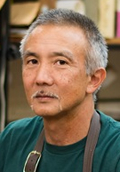 Ralph Miyashiro is an RPT who has served on the Southern California Area Exam Board. He is currently staff technician for the School of Music and Dance at San Diego State University.
Ralph Miyashiro is an RPT who has served on the Southern California Area Exam Board. He is currently staff technician for the School of Music and Dance at San Diego State University. 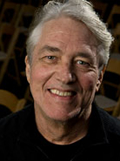 David Andersen has been a professional musician, recording artist, and piano technician/consultant for nearly four decades. He has been involved in the restoration and maintenance of hundreds of Steinway and Mason & Hamlin pianos during that time. Beginning in 1975 he apprenticed for two and a half years under Jack Cofer in Atlanta, Georgia; during the 1980s he studied at Steinway facilities both in New York and London. After moving to Southern California in 1981, David worked extensively with Sherman Clay, the Steinway dealer in most of California at that time, both as a concert/new piano preparation technician and as a quality control consultant/piano prep manager for Asian piano companies affiliated with Sherman Clay. He opened his own boutique piano sales showroom, the Atelier, in late 2005. He sells quality instruments at all price ranges, rents pianos for performances and recording, and presents intimate outdoor concerts and indoor salons with some of the world's finest pianists. Andersen continues to teach various aspects of his craft at Piano Technician's Guild conferences on the local, regional, national and international level. He has held one-day seminars in New York City, Boston, Phoenix, Chicago, Calgary, Baltimore, and Albuquerque, teaching the finer, more subtle aspects of tuning, voicing, regulation, artisanal rebuilding, and diagnostics. His classes always examine how a technician is being as well as what he/she is doing.
David Andersen has been a professional musician, recording artist, and piano technician/consultant for nearly four decades. He has been involved in the restoration and maintenance of hundreds of Steinway and Mason & Hamlin pianos during that time. Beginning in 1975 he apprenticed for two and a half years under Jack Cofer in Atlanta, Georgia; during the 1980s he studied at Steinway facilities both in New York and London. After moving to Southern California in 1981, David worked extensively with Sherman Clay, the Steinway dealer in most of California at that time, both as a concert/new piano preparation technician and as a quality control consultant/piano prep manager for Asian piano companies affiliated with Sherman Clay. He opened his own boutique piano sales showroom, the Atelier, in late 2005. He sells quality instruments at all price ranges, rents pianos for performances and recording, and presents intimate outdoor concerts and indoor salons with some of the world's finest pianists. Andersen continues to teach various aspects of his craft at Piano Technician's Guild conferences on the local, regional, national and international level. He has held one-day seminars in New York City, Boston, Phoenix, Chicago, Calgary, Baltimore, and Albuquerque, teaching the finer, more subtle aspects of tuning, voicing, regulation, artisanal rebuilding, and diagnostics. His classes always examine how a technician is being as well as what he/she is doing. 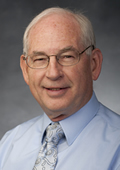 Keith has served as a tuning examiner, instructor and tutor on local, regional, and national levels for over 15 years. He has had experience as an audio sound engineer and has two sons in this field which has given him a unique insight on the relationship of sound and basic tuning theory.
Keith has served as a tuning examiner, instructor and tutor on local, regional, and national levels for over 15 years. He has had experience as an audio sound engineer and has two sons in this field which has given him a unique insight on the relationship of sound and basic tuning theory.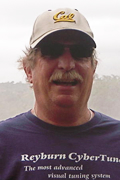 Carl
is a member of the CyberTuner Development Team, creating, optimizing
and expanding the software's capabilities. He is currently the staff
piano technician at the Village Recording Studio in West Los Angeles.
Carl
is a member of the CyberTuner Development Team, creating, optimizing
and expanding the software's capabilities. He is currently the staff
piano technician at the Village Recording Studio in West Los Angeles.
 Ward has been a PTG member since 1974 and is a recipient of the PTG "Member of Note" award. He was Regional Vice President of the Pacific Northwest Region for three years and PTG Institute Director in Grand Rapids and Seattle. He has won three PTG "Presidential Citations" as well as awards for "Outstanding Leadership", "PTG Cog" and "James H. Burton" awards from Pacific Northwest Region.
Ward has been a PTG member since 1974 and is a recipient of the PTG "Member of Note" award. He was Regional Vice President of the Pacific Northwest Region for three years and PTG Institute Director in Grand Rapids and Seattle. He has won three PTG "Presidential Citations" as well as awards for "Outstanding Leadership", "PTG Cog" and "James H. Burton" awards from Pacific Northwest Region.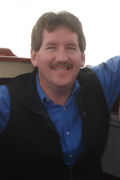 Paul has been involved with the production of the Sanderson Accu-Tuner since its beginning in 1982. As Al Sanderson retired from Inventronics, Paul transitioned to be responsible for the Accu-Tuner from development to production and distribution. Paul oversees all phases to assure that the SAT continues to be the finest electronic tuning aid in the industry. When Al passed away in November 2008, the continuation of Inventronics and the Accu-Tuner was already mapped out.
Paul has been involved with the production of the Sanderson Accu-Tuner since its beginning in 1982. As Al Sanderson retired from Inventronics, Paul transitioned to be responsible for the Accu-Tuner from development to production and distribution. Paul oversees all phases to assure that the SAT continues to be the finest electronic tuning aid in the industry. When Al passed away in November 2008, the continuation of Inventronics and the Accu-Tuner was already mapped out.